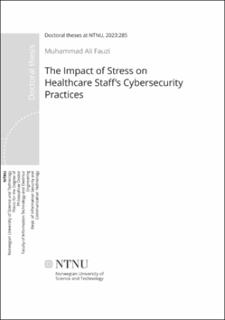| dc.contributor.advisor | Yang, Bian | |
| dc.contributor.advisor | Busch, Christoph | |
| dc.contributor.author | Fauzi, Muhammad Ali | |
| dc.date.accessioned | 2023-09-28T12:45:40Z | |
| dc.date.available | 2023-09-28T12:45:40Z | |
| dc.date.issued | 2023 | |
| dc.identifier.isbn | 978-82-326-7269-1 | |
| dc.identifier.issn | 2703-8084 | |
| dc.identifier.uri | https://hdl.handle.net/11250/3092751 | |
| dc.description.abstract | Digitalization has revolutionized the healthcare industry, offering numerous advantages. However, it has also introduced the risk of data breaches through cyber-attacks. Healthcare information systems, containing valuable data that can be sold at high prices, are often targeted by adversaries. Surprisingly, a recent report revealed that 82% of data leaks involved a human element. As a result, the study of human behavior in cybersecurity has gained significant attention. However, the relationship between stress levels and cybersecurity practices, particularly in the healthcare setting, has only been the subject of a small number of peer-reviewed studies. This study aims to fill this gap by examining the relationship between stress levels and risky cybersecurity practices among hospital workers. Additionally, it investigates how stress impacts email judgment performance. Furthermore, the study compares different strategies to develop effective multimodal stress detection systems. To achieve these objectives, the research methodology employs correlation analysis, causal analysis utilizing a randomized controlled trial (RCT), and comparative analysis of various machine learning models.
The correlation analysis reveals a positive correlation between stress levels and risky cybersecurity practices in Ghana, Indonesia, and the combined dataset from three countries (Ghana, Norway, and Indonesia), indicating that individuals experiencing higher stress are more likely to engage in behaviors compromising cybersecurity. The causal analysis shows that while stress does not directly compromise participants’ ability to detect phishing emails, higher stress levels are significantly correlated with lower accuracy in the Indonesian context. Furthermore, completion time is identified as a potential mediator of the impact of stress on email judgment performance, with longer time associated with better performance. While the result from Norway showed no significant difference, the result from Indonesia suggested that participants in the non-stress group took a significantly longer time to complete judging emails than participants in the stress group.
The comparative analysis of multimodal stress detection systems demonstrates the superiority of multiple sensor fusion models over individual sensors with the weighted score-level fusion approach getting the best performance. Furthermore, preprocessing such as feature normalization and feature selection was proven to improve system performance. In term of classifier, using Logistic Regression as the classifier yield the best results.
This study contributes to our understanding of the impact of stress on cybersecurity practices and emails judgment performance. These findings have important implications for hospital management, emphasizing the need for targeted training programs and support systems to enhance cybersecurity practices among staff. The comparative analysis provides insights into effective multimodal stress detection systems, promoting privacy and accuracy. In conclusion, It offers practical recommendations for healthcare organizations to enhance cybersecurity and provides insights for the development of effective multimodal stress detection systems. | en_US |
| dc.language.iso | eng | en_US |
| dc.publisher | NTNU | en_US |
| dc.relation.ispartofseries | Doctoral theses at NTNU;2023:285 | |
| dc.relation.haspart | Fauzi, Muhammad Ali; Yeng, Prosper; Yang, Bian; Rachmayani, Dita. Examining the Link Between Stress Level and Cybersecurity Practices of Hospital Staff in Indonesia. I: ARES 2021: The 16th International Conference on Availability, Reliability and Security. Association for Computing Machinery (ACM) https://doi.org/10.1145/3465481.3470094
This work is licensed under a Creative Commons Attribution International
4.0 License. CC-BY | en_US |
| dc.relation.haspart | Fauzi, Muhammad Ali; Yeng, Prosper; Yang, Bian.
Correlating Healthcare Staff’s Stress Level and Cybersecurity Practices in Norway - Published in: 2023 Intelligent Methods, Systems, and Applications (IMSA) https://doi.org/10.1109/IMSA58542.2023.10217783 | en_US |
| dc.relation.haspart | Fauzi, Muhammad Ali; Yeng, Prosper; Yang, Bian: Nimbe, Peter; Rachmayani, Dita.
Stress and Cybersecurity Practices among Hospital Staff in the Digital Age: An Empirical Study from Ghana | en_US |
| dc.relation.haspart | Fauzi, Muhammad Ali; Yeng, Prosper; Yang, Bian: Rachmayani, Dita; Nimbe, Peter.
Examining the Relationship Between Stress Levels and Cybersecurity Practices Among Hospital Employees in Three Countries: Ghana, Norway, and Indonesia - 2023 IEEE 47th Annual Computers, Software, and Applications Conference (COMPSAC) https://doi.org/10.1109/COMPSAC57700.2023.00209 | en_US |
| dc.relation.haspart | Fauzi, Muhammad Ali; Yang, Bian.
Multiple Sensor Fusion for Stress Detection in the Hospital Environment | en_US |
| dc.relation.haspart | Fauzi, Muhammad Ali; Yang, Bian; Yeng, Prosper Kandabongee.
Improving Stress Detection Using Weighted Score-Level Fusion of Multiple Sensor. I: SIET '22: Proceedings of the 7th International Conference on Sustainable Information Engineering and Technology. Association for Computing Machinery (ACM)
https://doi.org/10.1145/3568231.3568242
This article is an open access article distributed under the terms and conditions of the Creative Commons Attribution (CC BY) license (https://creativecommons.org/licenses/by/4.0/). | en_US |
| dc.relation.haspart | Fauzi, Muhammad Ali; Yang, Bian; Yeng, Prosper Kandabongee. Examining the Effect of Feature Normalization and Feature Selection for Logistic Regression Based Multimodal Stress Detection. I: 2022 International Conference on Theoretical and Applied Computer Science and Engineering (ICTASCE) https://doi.org/10.1109/ICTACSE50438.2022.10009720 | en_US |
| dc.relation.haspart | Fauzi, Muhammad Ali; Yang, Bian. Continuous Stress Detection of Hospital Staff Using Smartwatch Sensors and Classifier Ensemble. I: Studies in Health Technology and Informatics. IOS Press 2021 ISBN 9781643682266. s. 245-250 https://doi.org/10.3233/SHTI210607 (CC BY-NC 4.0) | en_US |
| dc.relation.haspart | Fauzi, Muhammad Ali; Yang, Bian; Blobel, Bernd. Comparative Analysis between Individual, Centralized, and Federated Learning for Smartwatch Based Stress Detection. Journal of Personalized Medicine 2022 ;Volum 12.(10) s. 1-15 https://doi.org/10.3390/jpm12101584 This article is an open access article distributed under the terms and conditions of the Creative Commons Attribution (CC BY) license (https://creativecommons.org/licenses/by/4.0/). | en_US |
| dc.relation.haspart | Fauzi, Muhammad Ali; Yang, Bian; De Moor, Katrien; Yeng, Prosper; Rachmayani, Dita; Busch, Christoph; Wetherell, Mark.
Can Stress Compromise Phishing Email Detection? | en_US |
| dc.title | The Impact of Stress on Healthcare Staffs’ Cybersecurity Practices | en_US |
| dc.type | Doctoral thesis | en_US |
| dc.subject.nsi | VDP::Technology: 500::Information and communication technology: 550 | en_US |

